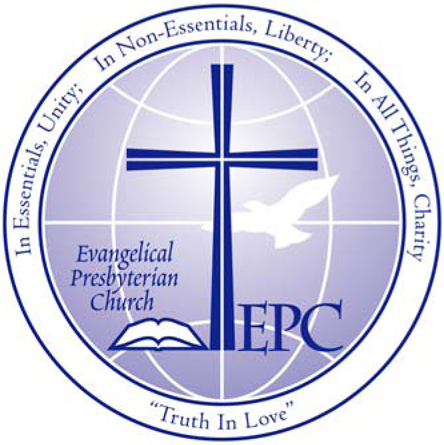 |
Devotionals for Women |  |
_______________
![[Photo of rain falling on a flowered field]](https://www.rpcerie.org/images/rain_falling_on_flowered_field.jpg)
Refresh
| “You gave abundant showers, O God; you refreshed your weary inheritance.” |
| —Psalm 68:9 |
| “Repent, then, and turn to God, so that your sins may be wiped out, that times of refreshing may come from the Lord.” |
| —Acts 3:19 |
Without water, we would all die. We rely on God to supply the rain in order for us to live. I am amazed at how quickly my drooping indoor plants revive once I pour a little refreshing water on them.
We humans can live in a dehydrated condition for a while. But, without natural water and without God-given spiritual water, we cannot live with the vigor, joy, and beauty that God intended when He made us.
A deficiency in the electrolytes that keep our bodies’ electrical systems in balance shows up in lethargy, fatigue, heart rhythm problems, dry skin, and a host of other dire consequences that appear when we have not had enough water. Our bodies only become refreshed with a return to proper hydration.
Let me ask each of us this question: How are our “spiritual electrolytes”? Those of our churches? Can we detect a loss of spiritual hydration there? Sometimes, we hardly know when our spiritual posture sags from lack of the refreshment that God wants to provide for us.
In fact, Jesus addressed this problem with the Samaritan woman in John 4:1-45 and called Himself the “Living Water.” Once she drank of His life-giving spiritual water, she left her water jug, ran rejoicing, and called her neighbors to come at once to meet with Jesus.
In John 7:1-24, we read of Jesus preaching to the crowds at the Feast of Tabernacles, and calling them to come to Him for living water. Like those in that long-ago crowd who responded to Jesus, once we learn to rely on this “Water of Life,” we will need the refreshing and the life-giving health it gives in order to serve Him well.
When we fall into patterns of mundane worship, when we droop in our service to God, when our hearts do not beat with vigor for Christ, and when our tired service yields no fruit for others, we know that we need to stop and ask God for a refreshment of the “Living Water” that only He can give us through His precious Son. Fortunately, we only need to ask Him and He will surely supply us with this “Living Water.”
Let us pray that we will clearly see our weariness and, in response, ask God for “rain in the springtime” before we dry up and blow away. Let us ask God for showers of refreshing and a renewal of life, so that we can serve Him effectively.
I particularly like the way this hymn describes such a prayer:1
Refresh Thy people on their toilsome way;
Lead us from night to never-ending day;
Fill all our lives with love and grace divine;
And glory, laud, and praise be ever Thine. Amen.
______________________
| 1 Roberts, Daniel C. God of Our Fathers. Public Domain. |
—Posted: Monday, April 15, 2019
_______________

The Sting
| “Where, O death is your victory? Where, O death is your sting?” The sting of death is sin, and the power of sin is the law. But thanks be to God! He gives us the victory through our Lord Jesus Christ. |
| —1 Corinthians 15:55-56 |
Whether you have an allergy to bee stings or not, the experience of being stung causes a pain that you will not easily forget. Two aspects of a bee sting cause the pain. First, the stinger itself, like a tiny sword, contains a sharp barbed point that stays in the skin until you remove it. Secondly, the venom causes a chemical reaction within one’s body producing pain and swelling.
The Apostle Paul used the “sting” to illustrate the experience of sin and death in the passage of Scripture quoted at the beginning of this blog post. Then, Paul continues with this theme, offering the ultimate resolution in Romans 6:23, when he wrote:
For the wages of sin is death, but the gift of God is eternal life in Christ Jesus our Lord.
We can easily see how death carries a “sting.” No one can dispute that this ending point comes to us as the ultimate battle that we face. As believers in the Lord Jesus, however, we are assured of the absence of the “sting” of this tool of the enemy.
If you have experienced the death of a loved one who lived as a follower of, and believer in, the Lord Jesus Christ, you know that the terror, no matter how terrible the death, has been softened as a result of the sacrifice Christ made for us on the cross. Jesus dealt with the victory over death when He died on the cross and rose again from the dead.
We, as humans, experience many other kinds of “stinging” events in our lives. We know the pain of scary medical diagnoses, the loss of jobs, difficult financial straits, legal battles, broken relationships, and numerous other kinds of disappointments.
Sometimes, we have faith to believe all that God has told us in His written Word concerning our experience with death. But, in the midst of our particular trials, we fail to realize that He has also removed the “stinger” from these lesser struggles, too.
Reason with me: that the God who has power over death, also has power over all other events in our lives. In response, let us resolve today to face all of life and death by trusting our God to remove the venom from each powerful heartbreak. We must remember that God has removed the sting!
—Posted: Monday, April 8, 2024
_______________
![[Drawing of Jesus leaving the tomb]](https://www.rpcerie.org/images/Jesus_leaves_the_tomb.jpg)
Accomplished
| “Speak comfort to Jerusalem, and cry out to her, that her warfare is ended, that her iniquity is pardoned; For she has received from the Lord’s hand double for all her sins.” |
| —Isaiah 40:1-2 NKJV |
“Hold on,” you say. “That’s a Scripture passage that we heard preached during Advent!” Or even, “Isn’t that passage referring to the exiled Jews in Babylon? Are you saying they could now come home to Israel? And, are you saying this is an Easter passage?”
Think about it. Couldn’t this announcement refer even more to the work Christ accomplished on the cross? And, couldn’t this be the rightful message He could proclaim to His disciples on that Resurrection Sunday? Jesus ended the warfare that has come against us because of our sin. He died in our place and God brought Him back to life.
Jesus’ last words from the cross can be heard in this passage when He spoke, “It is finished.” To respond, we need only to accept that pronouncement over our sins and accept the work that He has already accomplished for us. We can stand in the wonderful position of peace with God through Jesus. Romans 5:1-2 tells us:
Therefore, since we have been justified through faith, we have peace with God through our Lord Jesus Christ, through whom we have gained access by faith into this grace in which we now stand.
This Easter, may we bask in the glory of the accomplished work of Christ, and sing with thanksgiving this now-accomplished Advent hymn:1
Comfort, comfort ye my people,
speak ye peace, thus saith our God.
Comfort those who sit in darkness,
mourning ’neath their sorrow’s load.
Speak ye to Jerusalem
of the peace that waits for them;
Tell her that her sins I cover,
and her warfare now is over.
Yea, her sins our God will pardon,
blotting out each dark misdeed.
All that well deserved his anger
he no more will see or heed.
She hath suffered many a day,
now her griefs have passed away;
God will change her pining sadness
into ever-springing gladness.
______________________
| 1 Olearius, Johannes (1671). Tr. by Winkworth, Catherine. Comfort, Comfort Ye My People. Public Domain. |
—Posted: Monday, April 1, 2024
_______________
![[Photo of The Brook Kidron]](https://www.rpcerie.org/images/The_Brook_Kidron.jpg)
The Brook Kidron
| “The whole countryside wept aloud as all the people passed by. The king [David] also crossed the Kidron Valley.” |
| —2 Samuel 15:23 |
| “When he had finished praying, Jesus left with his disciples and crossed the Kidron Valley.” |
| —John 18:1 |
Even today, as the photo above shows, the Brook Kidron carries the foul waste from the city of Jerusalem. King David—in fleeing from his son, Absalom, who had usurped King David’s power and proclaimed himself king—sorrowfully crossed this brook into the desert in order to mourn. David prayed that God would allow him favor to let him again see his beloved city of Jerusalem and the Tabernacle of Jewish worship.
The King of Kings Himself took the same path on His way to the cross. He left, with Peter, James, and John, to spend the night in prayer on the Mount of Olives. Mark 14:33-34 describes Jesus’ spirit:
He took Peter, James and John along with him, and he began to be deeply distressed and troubled. “My soul is overwhelmed with sorrow to the point of death,” he said to them.
Jesus gives all of His followers a “Brook Kidron” to cross. Sometimes, He give us many such “Brooks.” Just as our Savior had to suffer, He gives us a path of suffering. Philippians 3:10 offers us this testimony of the Apostle Paul:
I want to know Christ and the power of his resurrection and the fellowship of sharing His suffering.
As God did with King David, and also with our Lord Jesus, He uses our “Brook Kidrons” to achieve His good and perfect will in us. I like the way that Charles Hadden Spurgeon describes it: 1
The King of Kings himself was not favored with a more cheerful or royal road. He passed over the filthy ditch of Kidron, through which the filth of Jerusalem flowed. God had one Son without sin, but not a single child without the rod. It is a great joy to believe that Jesus has been tempted in all points like as we are. What is our Kidron? Is it a faithless friend, a sad bereavement, a slanderous reproach, a dark foreboding? The King has passed over these. Is it bodily pain, poverty persecution, or contempt? Over each of these Kidrons the King has gone before us.
What results did God plan in the face of all these sorrows? David returned in triumph to his city. Christ arose triumphant from the grave. Thus, we have Spurgeon’s encouragement to us: 2
Courage, soldiers of the Cross, the King himself triumphed after going over Kidron, and so shall you.
______________________
| 1 Spurgeon, Charles Haddon. Morning and Evening. McLean Virginia: MacDonald Publishing Company, Public Domain. p. 304. |
| 2 Ibid. |
—Posted: Monday, March 25, 2024
_______________
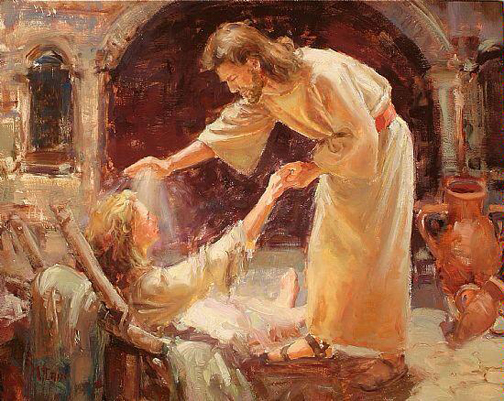
With Passion
| “The Lord is full of compassion and mercy.” |
| —James 5:11 |
Christ was full of compassion—“com - passion”: with passion. What a wonderful picture of the love of the Lord Jesus Christ, as He faced the cross. How many times does Scripture indicate that Jesus had compassion? So often we find the phrase: “When he saw the crowds, he had compassion.” 1 And, of course, compassion motivated Jesus, along with His love, to die in our place in such a horrifying manner.
In the Old Testament, compassion was symbolized by the Mercy Seat within the Holy of Holies of the Tabernacle. Once a year, the High Priest entered this sacred place to offer a sacrifice for the sins of God’s people. The Mercy Seat—the “hilasterion”—indicated to the people of God that He fully sympathized with their sin, their pain, and their sorrows. The New Testament Greek text of Romans 3:25 KJV reads: 2
[Jesus Christ] Whom God set forth to be a propitiation [mercy seat] through faith in his blood, to declare his righteousness for the remission of sins that are past, through the forbearance of God;
The moment Jesus took His last breath, Scripture records that the veil in the temple was torn in two, so that we all now have access to the mercy and love of Christ.
When we show compassion to others, we reflect Christ to them. When we take on someone else’s suffering, we put ourselves in their place, just as Christ did for us. When we invite others into our lives, we show the hospitality of Christ.
The mercy of God should flow through His people to others, just as it flowed constantly through Jesus’ earthly life. God the Father has compassion, Jesus the Son has compassion, and through the Holy Spirit, we can have compassion for others.
I am reminded of an old hymn that talks about the mercy seat. The mercy seat being a place of prayer, or a place of congregated believers who show forth Christ’s compassion.3
Come, ye disconsolate, where’er ye languish;
Come to the mercy seat, fervently kneel;
Here bring your wounded hearts,
Here tell your anguish;
Earth has no sorrow that heav’n cannot heal.
Joy of the desolate, light of the straying,
Hope of the penitent, fadeless and pure,
Here speaks the Comforter, tenderly saying,
“Earth has no sorrow that heav’n cannot cure.”
Here see the Bread of Life; see waters flowing,
Forth from the throne of God, pure from above;
Come to the feast of love; come, ever knowing
Earth has no sorrow but heav’n can remove.
______________________
| 1 To name just a few: Matthew 9:36, 14:14, 15:32, and 20:34 |
| 2 Quoted by Beth Moore in Moore, Beth. A Woman’s Heart. Nashville: LifeWay Press, 1995. p. 181. |
| 3 Moore, Thomas and Hastings, Thomas. Come, Ye Disconsolate. Public Domain. |
—Posted: Monday, March 18, 2024
_______________
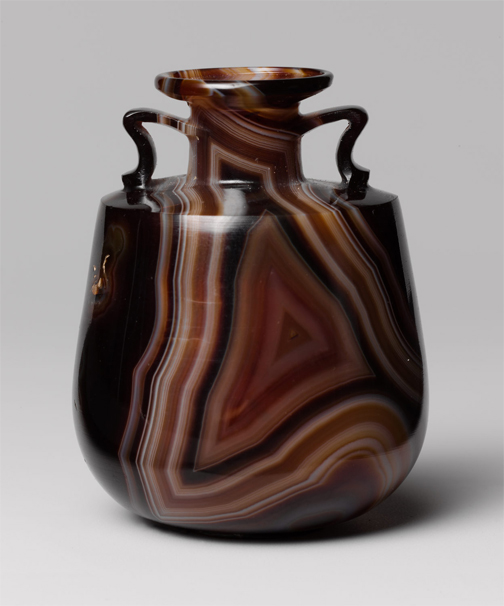
Dead Flies
| “Dead flies putrefy the perfumer’s ointment, and cause it to give off a foul odor.” |
| —Ecclesiastes 10:1 NKJV |
Something ruined! And, it was something with such an intentional, pleasure-causing purpose as an expensive perfume. Now it’s ruined! And, by what? A stray fly coming through the palace window into the boudoir of a wealthy maiden. The perfume—created with such skill by a talented expert artisan, skilled in the art and science of perfumery—totally spoiled by the ugly presence of a filthy, common fly.
When compared to the witness of a fine Christian, we are reminded that even this witness can be spoiled by the entrance of a foul, habitual sin. I appreciate the way that Charles Haddon Spurgeon describes it:
No matter though the vase be alabaster, and the perfume the most delicate, dead flies would destroy the precious nard, and even so minor faults will spoil a fine character. Rudeness, irritability, levity, parsimony [stinginess], egotism, and a thousand other injurious flies have often turned the exquisite perfume of a Christian’s life into a pestilent odor to those who were around him. 1
In comparison, the Apostle Paul, in 2 Corinthians 2:14-15, expresses God’s intent for us to live in such a way so that those around us effectively “smell” the sweet aroma of Christ. The Apostle offers this declaration:
But thanks be to God, who always leads us in triumphal procession in Christ and through us spreads everywhere the fragrance of the knowledge of him. For we are to God the aroma of Christ among those who are perishing.
God’s intention for us—to live in such a way that we spread His Presence like a fine perfume—can be ruined by the entrance of our sinful sloppiness, as though we left the lid off the bottle of perfume and flies entered, ruining the liquid. We can only remedy our sin by coming to Him with confession and repentance, so that we may receive His forgiveness and His restoration, thus giving us a new start under the power of His Holy Spirit.
During this time of Lent, let us examine our lives for those “dead flies” that mix in the stench of sin with the life-giving perfume of Christ that He created us to exhibit. May He spread abroad His love through the fragrance of our lives, purified by His precious blood.
______________________
| 1 Spurgeon, Charles Haddon. Spurgeon’s Devotional Bible. Grand Rapids: Baker Book House, 1964. p. 325. |
—Posted: Monday, March 11, 2024
_______________

Become the Bridge
| “Praise be to the Lord, to God our Savior, who daily bears our burdens.” |
| —Psalm 68:19 |
| “Carry each other’s burdens, and in this way you will fulfill the law of Christ.” |
| —Galatians 6:2 |
Did you ever stop to think what our lives would be like without bridges? People who live near rivers, or swamp land, would have a nearly impossible time getting to work or getting to common shopping areas without bridges. We can all be grateful for the continual burdens bridges carry to allow us ease in our daily lives.
Have you ever been a “bridge” for another person? As such, you became their help in traversing a tough spot in life, or helped them move on to the other side of a difficulty? The Simon and Garfunkel lyrics from the 1960’s come to mind:
When you’re weary, feeling small
When tears are in your eyes, I’ll dry them all (all)
I’m on your side, oh, when times get rough
And friends just can’t be found
Like a bridge over troubled water
I will lay me down
Like a bridge over troubled water
I will lay me down. 1
Certainly, if people without an eye to pleasing our Savior can think that way about their friends, how much more should we—who have the example of a God who bears us through this life, and of a Savior who bridged the gap on the cross for our sins—act as a willing bridge for those who need us to help carry them to wholeness?
Sometimes it even becomes necessary to act as a “covered bridge” for others: protecting them from more winds of adversity and from the cruel and bitter sting of sin and shame. Such people need the hospitality and healing of a safe and guarded place. And, from time to time, God calls us to offer this solace to His hurting children.
Jesus told us in John 15:13:
“Greater love has no one than this, that he lay down his life for his friends.”
The next time you drive over an expansive bridge, or see a covered bridge, remind yourself that just as we sometimes need bridges to arrive at our next destination, so Christ may have need for us to become a bridge for someone else on their journey through life!
______________________
| 1 Simon, Paul. “Bridge Over Troubled Waters.” ©1969. All Rights Reserved. These lyrics remain the sole property of the copyright owners. Included here under the “Nonprofit Educational Use Provision” of Section 107 (2022 Edition) of the United States Code, 2018 Edition, Supplement 4, Title 17 - COPYRIGHTS. |
—Posted: Monday, March 4, 2024
_______________
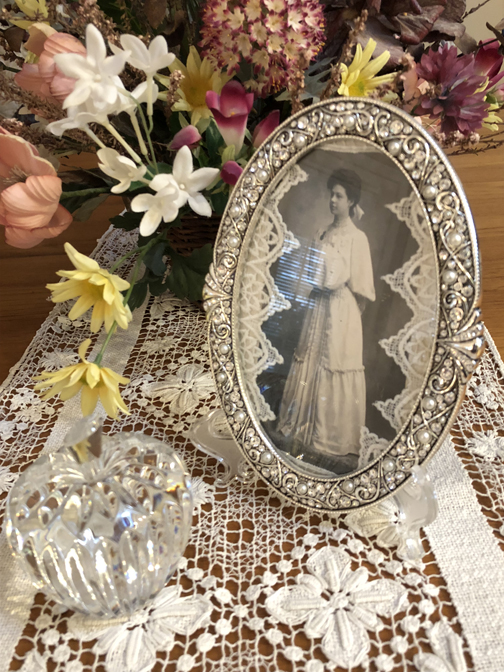
Hidden Treasures
| “Do not store up for yourselves treasures on earth, where moth and rust destroy, and where thieves break in and steal. But store up for yourselves treasures in heaven, where moth and rust do not destroy, and where thieves do not break in and steal. For where your treasure is, there your heart will be also.” |
| —Matthew 6:19-21 |
I have a beautiful photograph of my maternal grandmother as a teenager. What a treasure! I also have a Waterford crystal apple given to me by my music colleagues on the occasion of my retirement from teaching. Again, what a treasure! Once in awhile I take the opportunity to look at my various pieces of furniture, jewelry, dishes, photographs, and paintings that I consider true treasures and I marvel at these “things” that God has so graciously given me.
I don’t think Jesus was opposed to earthly treasures. But instead, He wants us to put them into proper perspective and use them as an illustration of the greater things He wants us to value. Even more than the way we take out our keepsakes and admire them, I believe He wants us to set aside the time, once in awhile, to admire the eternal treasures He gives us. Is there a better opportunity than during the Season of Lent for us to do just that?
Do you have familiar passages of Scripture that you memorized a long time ago, or learned as a child, but which have slipped into the background of your thinking? Why not take those Scripture passages out, dust them off, and reclaim them? For example, how long has it been since you have read and meditated on Psalm 23? Or, perhaps the Lord spoke to you and changed you through some other passage of Scripture that you haven’t looked at in some time. Take the time during the Season of Lent to read that passage in another translation, to study it verse by verse, word by word. If you do so, I believe you will discover that a treasure awaits you!
Another source, in my personal “glass case of memories,” comes through the hymns and spiritual songs that I have sung over and over throughout my lifetime. These hymns hold treasured phrases and living images of God’s truths. To review them brings me renewed blessing, challenges, gratitude, and love for my Lord.
If you journal your spiritual progress, like I do, the things that God teaches us daily, in our quiet time with Him, reveal a fortune of riches. I encourage you to join me in taking a look back through our journal entries. See how He has blessed us through the day-to-day revelation of His presence. The times He has met with us, answered prayer, and taught us about life with Him should truly make us rejoice in the treasures He has given to us.
So, I am suggesting that we all pull out the treasures we have stored in our hearts—treasures of Scriptures and spiritual songs, treasures of the day-to-day remembrances of His presence. We need to slowly turn them over in our minds and hearts, admiring the prized truths that bring our Savior closer and help us adore Him, the greatest Treasure of them all!
—Posted: Monday, February 26, 2024
_______________
![[Painting of a lamb and the cross]](https://www.rpcerie.org/images/behold_the_Lamb.jpg)
Behold the Lamb!
| The next day John saw Jesus coming toward him and said, “Behold, the Lamb of God, who takes away the sin of the world!” |
| —John 1:29 |
References to Jesus as “the Lamb of God,” come up often in the New Testament Scriptures—from His baptism by John, all the way to Revelation, the last book of the Bible. Most often the image of the Lamb refers to Christ’s sacrifice on the cross and His disposition as He made that sacrifice.
The challenge for us, who follow the Lamb during this Season of Lent, comes when we humbly acknowledge how far we fall from His standard.
The British evangelist and author, Roy Hession, refers to an address he heard in London in the 1940’s by a Mr. Marshall Shallis, who spoke of Jesus as:1
- The simple Lamb—helpless and dependent.
- The shorn Lamb—of His rights, His reputation, His position.
- The silent Lamb—never defending Himself or explaining Himself.
- The spotless Lamb—no resentment, no grudges, no bitterness.
- The substitute Lamb—carrying our sins, the scapegoat for us, scarred and humble.
If we make it our goal to be like Jesus, we need to consider how the Holy Spirit continually urges us to allow Him to accomplish more of these characteristics of the Lamb in us. We should accept the challenge during this Season of Lent to join in meditating on the love that led Jesus to become the Lamb for us. Then, let us listen as the Holy Spirit urges us to ask what qualities He would like to see blossom in our lives.
______________________
| 1 Hession, Roy, The Calvary Road. London: Christian Literature Crusade, 1950. Pp. 60-64. |
—Posted: Monday, February 19, 2024
_______________
![[Photo of a Welcome mat at a doorway]](https://www.rpcerie.org/images/welcome_mat.jpg)
Welcome
| “Come unto me, all ye that labour and are heavy laden, and I will give you rest.” |
| —Matthew 11:28 KJV |
I know that plenty of children do not find their fathers approachable—especially when connecting with their dads means reporting on some bad news. Having borne the brunt of numerous angry, abusive responses, they shy away from intimate relationships with their fathers.
This phenomenon is not limited to childhood. Even approaching people with whom we work, or with whom we volunteer, or to whom we are related can produce the same kind of reticence. If the individuals we intend to approach have rebuffed us in the past, we may stew a bit before we try to connect with them. I think of two Bible stories that clearly demonstrate this kind of fear:
- In certain chapters of Scripture—Genesis 27 - 33—we read the stories of Jacob and his first-born brother Esau. Due to Jacob’s deceptions, he received the blessing of his father instead of Esau. This resulted in anger and hatred from Esau and a plan to kill his brother. Jacob eventually moved to Hiran, to get away from his brother and with the intent of finding a wife.
After leaving Hiran many years later, richer and blessed with sons and daughters, he struggled when he considered whether or not to arrange a meeting with Esau again after all the intervening years. Jacob prayed and wrestled with God all night before the confrontation with Esau the next day.
God heard his prayers and Esau greeted Jacob with a warm welcome. However, because Jacob feared that his brother would seem unapproachable, Jacob suffered great fear of that meeting. - As recorded in the Book of Esther, the queen feared the king because of the edict he had issued that no one could come into his presence without his invitation. Anyone violating this decree would be killed. But, Queen Esther had agreed to approach the king on behalf of her people, the Jews. So, Queen Esther prayed and fasted, asking God to preserve her as she approached the king. God heard and answered her prayers.
Our God does not treat us in such a way that we need to fear coming to Him with our requests. A. W. Tozer writes: 1
God never changes moods or cools off in His affections or loses enthusiasm. His attitude toward sin is now the same as it was when He drove out the sinful man from the eastward garden, and His attitude toward the sinner the same as when He stretched forth His hands and cried, “Come unto me.” … He is always receptive to misery and need, as well as to love and faith. He does not keep office hours nor set aside periods when He will see no one.
When it comes to approaching God in our times of need, His open arms will always greet us. Yes, He welcomes us, just as various Scripture records that He did in both Old Testament times and in New Testament times—as He welcomed the beggars and the sick, and as He welcomed the children in Mark 10:13-16.
We must never consider that we are interrupting God to come to Him. We must never consider that our needs are too small for Him to meet. Instead, we must accept His gracious welcome and know that He never changes.
______________________
| 1 Tozer, A. W. The Knowledge of the Holy. New York: HarperCollins Publishers, 1961. p. 53. |
—Posted: Monday, February 12, 2024
_______________
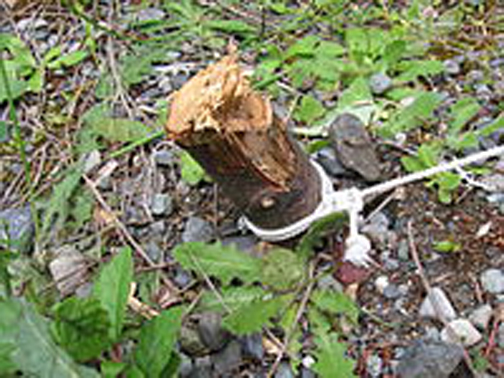
Our Tent Peg
| “From Judah will come the cornerstone, from him the tent peg.” |
| —Zechariah 10:4 |
The nation of Israel certainly knew about tent pegs. In their forty years of wandering the desert, and until the “permanent” temple in Jerusalem was built, they worshipped in a large tent or tabernacle, which from time to time they had to pick up and move to a different location in the desert.
In the Book of Exodus, we read that these tent pegs were crafted of bronze. They were mentioned throughout that Book and into the Book of Numbers. These tent pegs had a significant purpose in maintaining the stability of the tabernacle.
We all have our “tent pegs.” Our tent pegs“tent pegs” consist of those things we have crafted, or more likely received as a gift of God’s grace, that help us feel stable in the unfolding of our daily lives.
As a child, I felt secure because I had loving Christian parents and large Christian extended family. I lived in the same house until I left for college. I went to the same church, to the same school, and so forth, all through those years.
As an adult, I may not think I rely so heavily anymore on “earthly” tent pegs, but I guess that I do. I get stability from my home, my husband, my family, my church, my friends, and from even more.
Furthermore, each of us has likely suffered loss of something we have relied upon as a “tent peg.” The circumstances of our lives have caused us to lose something or someone we held dear that provided stability in our lives.
Even as God did with the Israelites, He sometimes asks us to pull up our tent pegs because He has a new venture for us. We may be thrust into a new situation that feels so different and unstable to us. Yet, God wants to show us that He is the unchangeable “tent peg” of our lives—the One on whom we need to rely. He provides the rock-solid stability upon which we need to depend.
Though the Psalmist used somewhat different images, in Psalm 46:1-7 we read the similar sentiment:
God is our refuge and strength, an ever-present help in trouble. Therefore, we will not fear, though the earth gives way and the mountains fall into the heart of the sea, though its waters roar and foam and the mountains quake with their surging.
There is a river whose streams make glad the city of God, the holy place where the Most High dwells. God is within her, she will not fall; God will help her at break of day.
Nations are in uproar, kingdoms fall; he lifts his voice, the earth melts. The Lord Almighty is with us; the God of Jacob is our fortress.
Whether we want to think of God as a refuge and a fortress in the storm when everything falls around us, or the stable “tent peg” who keeps the tent of our lives upright and stable, we do our best when we consciously and consistently rely on Him, rather than on any earthly tent pegs, of which we tend to expect too much.
—Posted: Monday, February 5, 2024
_______________

Priorities
| “But seek first his kingdom and his righteousness, and all these things will be given to you as well.” |
| —Matthew 6:33 |
With what do you concern yourself the most? I can honestly say that I spend most of my thoughts on those things that I can do nothing about except to pray. Jesus knew we tend to suffer the most over things that would actually take a miracle of His grace to resolve.
In His Sermon of the Mount, Jesus used as His illustration the worries about food and clothing—something we would all commonly worry about, if we didn’t have them. But, rather than telling His disciples to pray about those things, or giving them solutions to the potential problems the lack of those things might present, He tells them—and us—to put our minds first on the requirements of His Kingdom and also on the righteousness He expects of us.
Sometimes, in order to get our lives straightened around after a deeply embedded sin and its consequences, we think most about the consequences. Instead, Jesus turns this idea on its head and tells us to first take care of the sin problem. He is the very embodiment of righteousness. And, He has graciously made a way, through His death on the cross, to make us righteous, too. He speaks peace with the words, “I will take care of the other problems.”
Do we put His Kingdom first? Are we anxious about living righteously throughout each new day of the year 2024, at the beginning of every new venture, and particularly whenever we are faced with new or old troubles?
I was interested to see that in James 5:13-16, where the Apostle teaches us about praying for a sick member of a congregation, he admonishes those praying to confess their sins one to another. Would we consider that important when a man’s or woman’s life hangs in the balance? Certainly God does.
As we continue into the year 2024, whatever worries we may have, if we start by first dedicating ourselves to the work of His Kingdom and His righteous requirements for our lives, we can remain assured that God has the power to act in our behalf. I love the way that Charles Spurgeon addresses the verse at the beginning of this blog post: 1
What a promise this is! Food, raiment, home, and so forth, God undertakes to add to you while you seek Him. You mind His business, and He will mind yours. If you want paper and string, you get them given in when you buy more important goods; and just so all that we need of earthly things we shall have thrown in with the kingdom.
______________________
| 1 Spurgeon, Charles H. Faith’s Checkbook. Chicago: Moody Press, 1980. p. 150. |
—Posted: Monday, January 29, 2024
_______________

A Spoonful of Sugar
| “For men are not cast off by the Lord forever. Though he brings grief, he will show compassion, so great is his unfailing love. For he does not willingly bring affliction or grief to the children of men.” |
| —Lamentations 3:31-33 |
You have undoubtedly seen the Disney character, Mary Poppins, in the movie with that name, trying to get the Banks children to clean the messy nursery. She finally sings a song to them with the lyrics: “A spoonful of sugar makes the medicine go down.”
An account records 1 that after an unsuccessful struggle to come up with a song for the movie, lyricist Robert Sherman went home one evening to find that his children had just taken the Sabin polio vaccine. In asking if it hurt, his son explained that he had felt no pain because the nurse had given him the vaccine on a tiny sugar cube. This gave Sherman the inspiration he needed for the lyrics to the now-famous song.
When we suffer various problems and afflictions in our lives, I truly believe that God devises all kinds of “sugar” for us, His dearly loved children. Though our troubles may cause us great pain and anguish, God consistently sends His grace to help us bear the suffering. Our God pours into us as much—or even more—mercy, even as He may pour into us His discipline.
When I read the Old Testament Book of Judges, it always amazes me. Over and over again, God gives Israel a judge with His special Word for them to follow. Once the judge dies, they begin to increase their sin and things go awry again.
The author of the Book of Judges records the length of time the children of Israel have to deal with their disobedience. Then, God calls another judge. Each time, I read the words, “So the land had peace for ?? years,” I take particular note that the years of peace always exceed the years that they suffered war and turmoil. 2
As we look back over the years of our lives, and as we move forward into the future, we must search for the very evident signs of the grace that God sends us during our trials. We then must write the instances of His grace down in some form that we can later review and remember. This little exercise will encourage us to see that God really does care, that He walks with us, and that He gives us gifts beyond our imagination to help us through the pain.
The Puritan writer, Thomas Watson, says it this way: 3
He [God] will not over-afflict. He mixes mercy with all our afflictions. If he gives us wormwood to drink, he will mix it with honey. In every cloud a child of God may see a rainbow of mercy shining.
______________________
| 1 Sherman, Robert. A Spoonful of Sugar Online Disney Wiki. |
| 2 For example: Judges 3:11, 3:30, 5:31, and 8:28 |
| 3 Watson, Thomas, as quoted in Rushing, Richard, editor. Voices. Carlisle, PA: The Banner of Truth Trust, 2009. p. 228. |
—Posted: Monday, January 22, 2024
_______________

All Things Hold Together
| “He is before all things, and in him all things hold together.” |
| —Colossians 1:17 |
God has gifted some people with the ability to put things together well and to even maintain them in proper working order. For me, things rarely work as I envision them. And, they certainly would not hold together through years of use and possible misuse.
Do you ever wonder how God keeps the runners’ legs from falling off in an Olympic race? Or, how He keeps a person’s heart from exploding, when he or she gets overly excited? What about the way He can keep a child’s “feet on the ground” at Christmas time? The Scripture verse at the beginning of this blog post tells us that not only does God create everything, He also holds all things together!
At this time every school year, I used to teach the song, “He’s Got the Whole World in His Hands.” I did so because history tells us that Dr. Martin Luther King, Jr. loved this particular spiritual. The song also certainly touches on the sovereign power of our God in holding everything in our world together.
Sometimes it feels like our personal “world” will surely blow apart. In response to such feelings, God speaks through the Psalmist Asaph in Psalm 75:3 and tells us:
“When the earth and all its people quake, it is I who hold its pillars firm.”
Ahh! What an assurance that verse brings. We can likewise say:
“When my world quakes, it is God who holds its pillars firm.”
We should say that sentence over and over, until we realize that the Sovereign Lord holds us in His hands! Because He does so, we will not fall apart.
—Posted: Monday, January 15, 2024
_______________
![[Photo of the measuring of the circumference of a baby's head]](https://www.rpcerie.org/images/infinite.jpg)
Infinite
| “Oh, the depth of the riches of the wisdom and knowledge of God! How unsearchable his judgments, and his paths beyond tracing out!” |
| —Romans 11:33 |
We humans get stuck on measurements. We describe our world that way. We compare and make sense of things with numbers. From the measuring rod and the scale or tape measure in the delivery room to our obsession with our weight and an obituary giving our age at death, we describe and understand ourselves by the numbers.
Yet, numbers alone do not apply to God. In fact, He simply cannot be measured. He is limitless in His being, in His power, in His understanding, and in His love. I like the way that A. W. Tozer explains it: 1
Is it not plain that all this [measurement] does not and cannot apply to God? It is the way we see the works of His hands, but not the way we see Him. He is above all this, outside of it, beyond it. Our concepts of measurement embrace mountains and men, atoms and stars, gravity, energy, numbers, speed, but never God.
We cannot speak of measure or amount or size or weight and at the same time be speaking of God, for these tell of degrees and there are no degrees in God. All that He is, He is without growth or addition or development. Nothing in God is less or more, or large or small. He is what He is in Himself, without qualifying thought or word. He is simply God.
This understanding of our God, calls for worship of Him and a renewal of our faith. The One who has called us to Himself can capably care for us. He can see us, understand us, have compassion for us, and send help to us when we have no stores of our own.
Like those gathered at Cana, we may be out of wine at a wedding. But, with Him in the room, we have all the resources we need to fulfill our responsibilities. (See the Parable in John 2:1-11.)
______________________
| 1 Tozer, A. W. The Knowledge of the Holy. New York, NY: Harper Collins Publishers, 1961. Pp. 45-46. |
—Posted: Monday, January 8, 2024
_______________
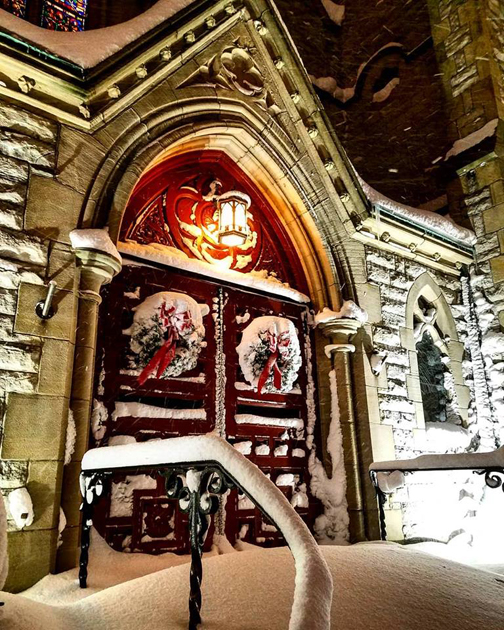
Janus
| “The Lord will watch over your coming and going both now and forevermore.” |
| —Psalm 121:8 |
The name for the month of January comes from the name of Janus, the Roman god of doorways. This god had two faces: one looking forward and one looking backwards. As we step over the threshold into this new year, we certainly have a better view of the year behind us than we do of the one ahead.
We constantly read in the Psalms that we are to consider the Lord’s works and, by doing so, see all that He has done. This good advice is illustrated many times in Scripture.
In a story recorded in 1 Samuel 7, Samuel met with the Israelites at Mizpah to confess their sins and cry out to God for deliverance from the Philistines. Here Samuel took a stone and set it up, naming it “Ebenezer,” saying, “Thus far has the Lord helped us.”
At this threshold of a new year, we should look back long enough to see how the Lord has helped us through the year just past. I like to make a list of the high points of each year. Then, I take note of how impossible it would have been to meet the challenges and enjoy the blessings without the direct intervention of our Lord.
Looking forward into the new year presents a bit of a harder task. And, lest we get into too much daydreaming, as I often do, let me warn each of us about the dangers that forward thinking often presents. We cannot possibly know what lies ahead of us in the new year. As much as we would like to plan it out, we don’t have that luxury. We need to remember that God controls our future. We do not.
Nevertheless, we do need to consciously and volitionally trust God with what lies ahead. We often will not know what the next day will bring. Yet, we should not live in fear, or presume life will always work out according to our careful plans. If we belong to the Sovereign God, we know that we can rely on His wisdom to guide us and His love to watch over us.
I pray that we will know more about how to live our lives by following the way of trust, to live in peace with our future, even while we do not know what this new year will bring. We can depend on the One who knows every day before we get to it, and we can fully trust the One who will bring light to the pathways of our lives. As the Psalmist has committed himself, recorded in Psalm 119:105-106, let us also say:
Your word is a lamp to my feet and a light for my path. I have taken an oath and confirmed it, that I will follow your righteous laws.
______________________
| 1 Note: The photo at the top of this devotional of The Cathedral of St. Paul, Erie, Pennsylvania, was taken by photographer, Pat Bywater, December 26, 2017. |
—Posted: January 1, 2023



